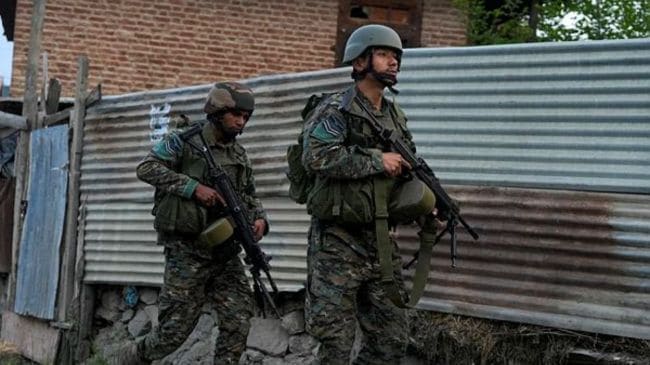Opinion We need a strategy that makes Pakistan shun proxy wars once and for all
India's response can build on Pakistan's failure — the terror tool doesn't have support, including in J&K
 The current near-war may be an opportunity to revisit the legacy of past wars while crafting a well-thought-out and patient response to achieve ‘strategic peace’ with Pakistan.
The current near-war may be an opportunity to revisit the legacy of past wars while crafting a well-thought-out and patient response to achieve ‘strategic peace’ with Pakistan. Apart from other measures, a kinetic response to the Pahalgam massacre was inevitable. The sheer brazenness of the terrorists who targeted innocent tourists and attempted to disturb communal peace in India warranted such a response. Indian forces responded on May 7 by targeting nine key sites of three Pakistan and PoK-based terror groups. Since then, the two sides have been locked in aerial aggression, which seems to be escalating. In military terms, the stage has not yet reached the level of a “limited” war.
Pakistan’s capacity to sustain hostilities is far less than that of India. However, the embattled General Asim Munir could well decide to showcase his country’s “nuclear muscle” as a desperate act aimed at inviting international intervention to de-escalate. At that stage, Pakistan may try to internationalise the Kashmir issue, equating it with the issue of Palestine. There is no doubt that India has enough resources to thwart any such attempt.
That said, it is imperative to appreciate that India and Pakistan have lived with wars since their birth as sovereign nations. This “limited” near-war is surely going to add to that legacy for generations on both sides. In order to become a developed country, India needs to resolve the Pakistan issue once and for all. The current near-war may be an opportunity to revisit the legacy of past wars while crafting a well-thought-out and patient response to achieve “strategic peace” with Pakistan.
The British colonial power left the Indian Subcontinent divided and Partition uprooted millions on both sides. The stories of violence on both sides can put humanity to shame. Though millions of Muslims remained in their homeland in India, Partition was — and even today is being — described by some Western and South Asian experts as a faith-based division of the Subcontinent. It has distorted public discourse in both countries and created space for hate and intolerance.
Another manifestation of the legacy of Partition came quickly with the accession of Jammu and Kashmir to India. This, too, was — and is still being seen — by some Western and South Asian experts through a communal lens. The India-Pakistan war in 1947-48 led to another division — this time of the state of Jammu and Kashmir. This Partition was challenged by both sides and a lot has happened since then. This is the second legacy of war between the two sides. It has been used as a basis for destructive interference by Pakistan in Jammu and Kashmir for decades and as a rationale for the operation of its proxies — terror groups.
The third, most defining, legacy of war came in 1971, when, with Indian support, the people of East Pakistan succeeded in their struggle to gain independence from West Pakistan. For Pakistan, the creation of Bangladesh remains an open wound, especially for the Pakistan army, which portrays itself as the “eternal saviour” of the country. Blaming India for its own failures to handle insurgencies in Balochistan and Khyber Pakhtunkhwa partly stems from this legacy of the 1971 war.
The problems between India and Pakistan kept compounding at each stage in their history. Before any reconciliation could happen, another pitch for war would pit one side against the other. The historical baggage kept becoming heavier with each decade. The events in Afghanistan, too, have had a deep impact on India-Pakistan dynamics ever since “violent jihad” was taught as a “tool of resistance” to Afghans against the Kabul government, which was supported by “godless” Soviet troops. Pakistan agreed to become the frontline state to execute this project on behalf of the US, Saudi Arabia and their allies from 1979 to 1989.
However, Pakistan has continued to use this “tool” against neighbours to fulfil its own agenda for the past 36 years. Pakistan has seized on some of its internal divisions and some fissures within India to further its project across its borders. Therefore, when someone refers to terror groups as “Islamic” terror groups, it suits the Pakistani project and builds its narrative. Fortunately, however, Pakistan has repeatedly failed in creating any mass base for the use of its “tool” in India, including in Jammu and Kashmir. This must be factored into India’s strategic response.
Historically, not many countries have succeeded in carrying out genuine reconciliation after the end of wars or after a long period of active hostilities. Russia and China are two nations that have done so and are reaping benefits today. East and West Germany, too, reconciled with the baggage of a “dark past”, which they have consciously addressed for the sake of generations to come and the future of Europe.
Currently, and understandably, kinetic actions are hogging the mindspace on both sides. The de-escalation will happen eventually, hopefully without any substantive losses to India. India is well-placed to handle that next step. It is also well aware that every terrorist action will need a unique response. That is why there is an urgent need for deep thought on framing a strategic response, one that ensures strategic peace with Pakistan, so that it shuns its proxy wars once and for all. Moreover, Pakistan has already suffered the most significant strategic loss in the current battle by trying to militarily target Jammu and Kashmir, which it claims to support. By harming thriving tourism, Pakistan is now indelibly etched in each Kashmiri mind as the violator of the economic prosperity and advancement of the Kashmiri people.
The writer is a security analyst and former director general of police




